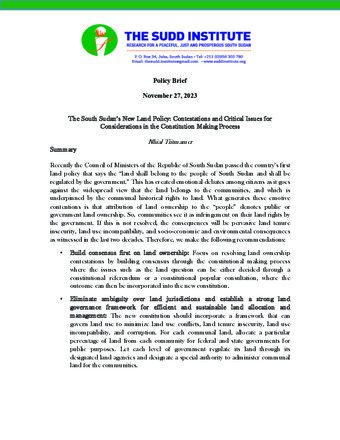The South Sudan’s New Land Policy: Contestations and Critical Issues for Considerations in the Constitution Making Process
Publication Summary
Recently the Council of Ministers of the Republic of South Sudan passed the country’s first land policy that says the “land shall belong to the people of South Sudan and shall be regulated by the government.” This has created emotional debates and contestations among citizens as it goes against the widespread view that the land belongs to the communities, and which is underpinned by the communal historical rights to land. What generates these emotive contestations is that the ownership of the land by the “people” denotes public or government land ownership and is therefore contested. If this disagreement is not resolved, the consequences will be continued, pervasive land tenure insecurity, land use incompatibility, and resultant socio-economic and environmental consequences as witnessed in the last two decades. Therefore, we make the following recommendations:
- Build consensus first on land ownership: Focus on resolving land ownership contestations by building consensus through the constitutional making process where the issues such as the land question can be either decided through a referendum or a popular consultation, where the outcome can then be incorporated into the new constitution.
- Eliminate ambiguity over land jurisdictions and establish a land governance framework for efficient and sustainable land allocation and management: The new constitution should incorporate a framework that can govern land use to minimize land use conflicts, land tenure insecurity, land use incompatibility, and corruption. For each communal land, allocate a particular percentage of land from each community for federal (national) and state government for public purposes. Let each level of government regulate its land through its designated land agencies and designate a special authority to administer communal land for the communities.
- Pursue data and evidence-based approach in resolving land ownership contestations: Commission studies on land issues to inform policy formulation and the constitutional making process.
Nhial Tiitmamer has served as the Director of the Environment and Natural Resources Program at The Sudd Institute where he is currently on leave to work with United Nations in South Sudan (UNMISS). He has served as an Adjunct Assistant Professor at the University of Juba where he has taught Environmental Economics, Natural Resources Economics and Environmental Sociology. Between November 2021 and November 2022, Nhial worked as Senior Environment Associate with the United Nations High Commissioner for Refugees (UNHCR) in Juba. Before returning from Canada in 2013, Nhial worked at Arletta Environmental Consulting in Calgary and at University of Alberta’s Augustana Campus in Camrose in Alberta, Canada. Nhial’s research focusses on natural resources governance, environmental protection, climate change, and sustainable energy. He was awarded in May 2023 by the Board of Directors of The Sudd Institute with Research Impact Award for policy impacts. Nhial holds a B.A. in Environmental Studies with a minor in English Literature from the University of Alberta and an M.Sc. in Sustainable Energy Development from the University of Calgary in Alberta, Canada.

